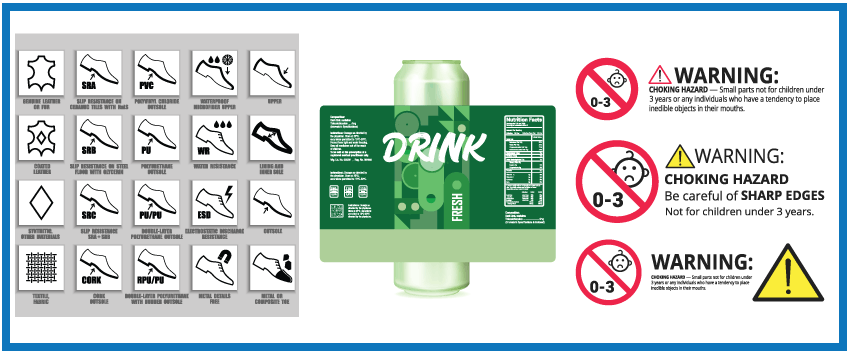 Correct product packaging and labelling is crucial not only for the customer experience, but also for their safety. Misinformation can be incredibly damaging, and the day-to-day products we purchase are no exception.
Correct product packaging and labelling is crucial not only for the customer experience, but also for their safety. Misinformation can be incredibly damaging, and the day-to-day products we purchase are no exception.
In the UK, product labelling laws can get very specific. Below, we’ve provided the general rules for labelling products in retail, as well as some specific examples.
Product Labelling Requirements in the UK
In the UK, there are certain pieces of information that aren’t legally required on a product label, but if you do choose to include them, they must be entirely accurate. If information is included on a product label, it must not be misleading, as it’s crucial they provide the right information for the product. Some of these criteria may include:
- The product size, quantity, or weight
- Price
- Material
- Where and when it was made
- What the product claims to be able to do
- Any endorsers of the product
Retailers also have a specific set of rules on their product labels. For example, they’re legally required to include the price of products (in sterling, and including VAT), the price of a single product when sold loose, and metric measurements for unit pricing.
Product-Specific Labelling
In certain cases, there are products which have their own legal labelling requirements. This includes the selling of precious metals, footwear, food and drink, and products for children.
Footwear
Apart from second-hand or protective footwear, there are strict rules around what should be included on footwear labels. This includes the materials that make up at least 80% of the shoe, including the upper, outer sole, lining, and sock. If these are made of multiple materials, the two most used materials must be stated.
Food and Drink
When it comes to food and drink, there are different rules for what must be labelled on pre-packed or non-prepacked foods. Non-prepacked foods are foods that are sold out of wrapping, for example, those sold in restaurants, bars, and bakeries. These foods need to display:
- The name of the food
- Allergen information and any other necessary warnings
- If any ingredients have come from genetically modified sources, or have been irradiated
However, the information required on prepacked food is far more in depth. These need to include information on:
- The name of the food and net quantity
- A full list of ingredients, including allergens in bold font
- The best-before or use-by date
- The name and address of the food business operator responsible for the product
- A nutrition guide to the food item
- Storage and cooking instructions, where necessary
- Origin marking
- Any necessary warnings
Whether to use a ‘best before’ or ‘use by’ label will vary by item. However, generally speaking, best before will be the appropriate term for most foods. This label means that, if the food is being consumed after the date shown, the retailer cannot be held responsible for a decrease in quality. However, they can still sell the food item. Use by dates, however, are stricter and are typically used when there is a microbiological risk to the consumer if eaten after the date shown.
Products for Children
Labels on products for children are typically much more warning-orientated, as they outline what risks could arise for a child when around the item. Usually, this comes in the form of choking warnings, age restrictions, and ‘adult supervision’ labels.
Any warnings or labels required for children’s toys should be clearly visible either on the product itself or on its packaging, according to the Toy Safety Directive. Where possible and necessary, it should also be included in the user manual.
Stay Organised with Label Source
When you’re confident your products are labelled correctly, have a look at our supply of stock control and identification tags to keep your items organised. In fact, at Label Source, we supply a vast range of various safety signs and labels to keep you on top of your health and safety.
For more information, have a look at our blog, or follow us on Twitter for the latest health and safety news.